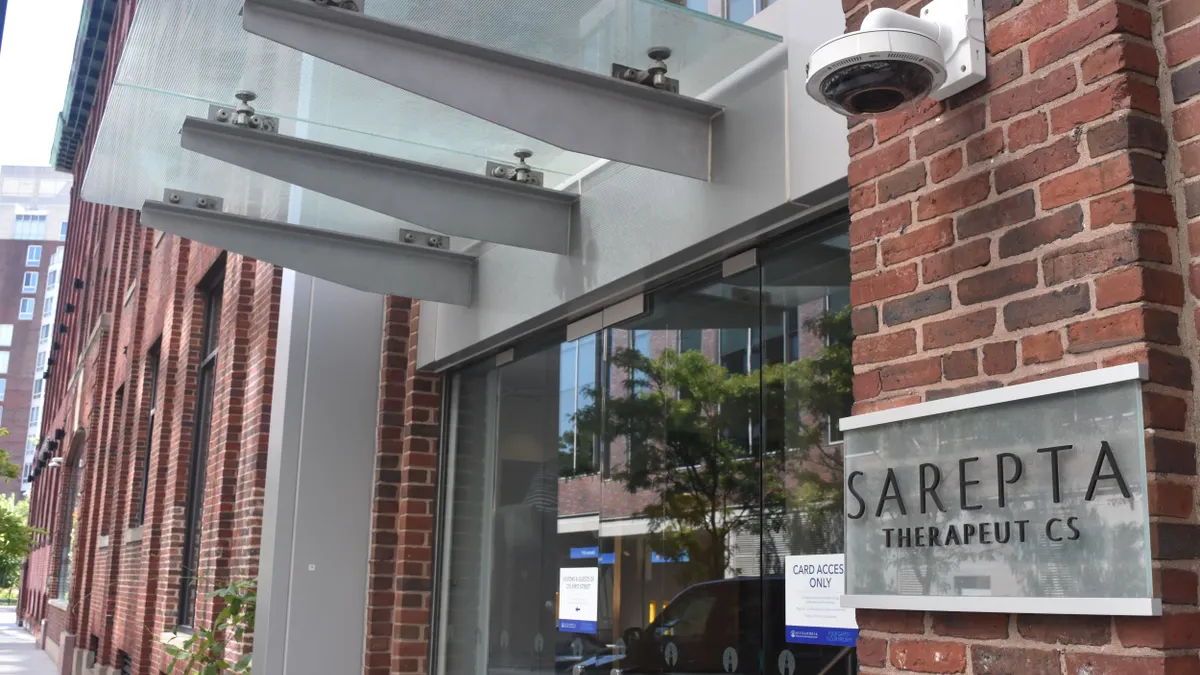Dive Brief:
- Sarepta Therapeutics shares slid 19% early Wednesday after the biotechnology company lowered its sales forecast for the year on the heels of a slower-than-expected first quarter for its top-selling product.
- Full-year product revenue will likely climb to between $2.3 billion and $2.6 billion, Sarepta said Tuesday after the market closed. That’s down from an estimate offered in February of $2.9 billion to $3.1 billion.
- First-quarter revenue for Elevidys, the company’s closely watched gene therapy for Duchenne muscular dystrophy, dipped to $375 million from $384 million in the fourth quarter of 2024. Company executives said some patients put off treatment while seeking more information about a recent patient death. A severe flu season and administrative delays in starting infusions also limited sales, they said.
Dive Insight:
Sarepta is in the middle of a political storm while trying to manage sales of a therapy it believes can revolutionize treatment for Duchenne. The company last year won approval to market Elevidys to almost all patients with this rare, muscle-wasting disease, after former high-ranking FDA official Peter Marks overrode agency reviewers who had concerns about Sarepta’s clinical data.
The decision drew fire from critics, including oncologist Vinay Prasad, who was hired Tuesday to succeed Marks as director of the FDA’s Center for Biologics Evaluation and Research. The market greeted Prasad’s appointment with a selloff of gene and cell therapy stocks like Sarepta’s, which was down more than 20% in Tuesday afternoon trading. Prasad previously called Elevidys a “bull---- gene therapy product.”
Combined, the new hire and lowered sales outlook create a “near worst-case day” for Sarepta, according to Baird analyst Brian Skorney. With Prasad now overseeing vaccines and certain genetic medicines, investors are bracing for “a significant adverse change in the FDA-Sarepta relationship,” Skorney wrote in a note to clients. Sarepta shares traded above $64 on Monday; by early Wednesday, they were close to $38 apiece.
Sarepta CEO Doug Ingram wouldn’t comment specifically on the appointment of Prasad during a conference call with investors and analysts. But Ingram said he’s confident the FDA will remain “an organization dedicated to following great science and fulfilling its mission of bringing life-enhancing therapies that are safe and efficacious to patients.”
As for Elevidys sales, Ingram said he expects to see a “significant uptick” starting in the summer, when patients and families have more time to deal with the extensive monitoring required with the therapy. Sarepta is also working to get more patients to sites with greater capacity, as its top treatment centers are sometimes booked a year or more out.
Meanwhile, Sarepta is attempting to shorten the window between when a patient starts the process of obtaining treatment and actually gets the infusion, Ingram said. That currently takes about a month to six weeks longer than the company anticipated, in part because of more rigorous screening protocols.
If the longer timelines translate to better patient safety and monitoring, that would be a good thing overall for Elevidys, William Blair analyst Sami Corwin wrote in her own note to investors. In that case, “we are supportive of a slightly delayed revenue stream.”














